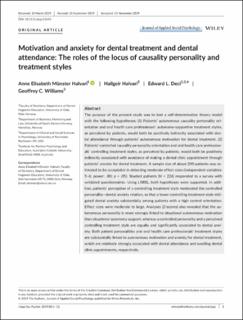| dc.contributor.author | Halvari, Anne Elisabeth M. | |
| dc.contributor.author | Halvari, Halgeir | |
| dc.contributor.author | Deci, Edward | |
| dc.contributor.author | Williams, Geoffrey C. | |
| dc.date.accessioned | 2020-02-18T14:39:38Z | |
| dc.date.available | 2020-02-18T14:39:38Z | |
| dc.date.created | 2020-01-16T14:07:46Z | |
| dc.date.issued | 2019 | |
| dc.identifier.citation | Journal of Applied Social Psychology. 2019, 1-12. | en_US |
| dc.identifier.issn | 0021-9029 | |
| dc.identifier.uri | https://hdl.handle.net/11250/2642387 | |
| dc.description.abstract | The purpose of the present study was to test a self‐determination theory model with the following hypotheses: (1) Patients’ autonomous causality personality orientation and oral health care professionals’ autonomy‐supportive treatment styles, as perceived by patients, would both be positively indirectly associated with dental attendance through patients’ autonomous motivation for dental treatment. (2) Patients’ controlled causality personality orientation and oral health care professionals’ controlling treatment styles, as perceived by patients, would both be positively indirectly associated with avoidance of making a dental clinic appointment through patients’ anxiety for dental treatment. A sample size of about 200 patients was estimated to be acceptable in detecting moderate effect sizes (independent variables: 5–6; power: .80; p < .05). Student patients (N = 226) responded to a survey with validated questionnaires. Using LISREL, both hypotheses were supported. In addition, patients’ perception of a controlling treatment style moderated the controlled personality—dental anxiety relation, so that a lower controlling treatment style mitigated dental anxiety substantially among patients with a high control orientation. Effect sizes were moderate to large. Analyses (Z‐scores) also revealed that the autonomous personality is more strongly linked to situational autonomous motivation than situational autonomy support, whereas a controlled personality and a perceived controlling treatment style are equally and significantly associated to dental anxiety. Both patient personalities and oral health care professionals’ treatment styles are substantially linked to autonomous motivation and anxiety for dental treatment, which are relatively strongly associated with dental attendance and avoiding dental clinic appointments, respectively. | |
| dc.language.iso | eng | en_US |
| dc.rights | Navngivelse-Ikkekommersiell 4.0 Internasjonal | * |
| dc.rights.uri | http://creativecommons.org/licenses/by-nc/4.0/deed.no | * |
| dc.title | Motivation and anxiety for dental treatment and dental attendance: The roles of the locus of causality personality and treatment styles | en_US |
| dc.type | Peer reviewed | en_US |
| dc.type | Journal article | en_US |
| dc.description.version | publishedVersion | |
| dc.source.pagenumber | 1-12 | en_US |
| dc.source.journal | Journal of Applied Social Psychology | en_US |
| dc.identifier.doi | 10.1111/jasp.12645 | |
| dc.identifier.cristin | 1774941 | |
| cristin.ispublished | true | |
| cristin.fulltext | original | |
| cristin.qualitycode | 1 | |

